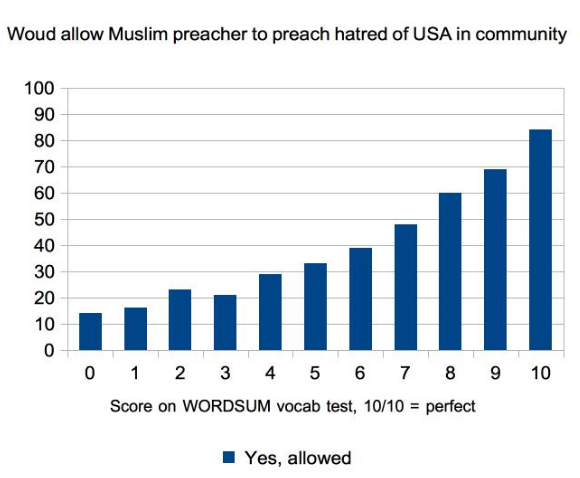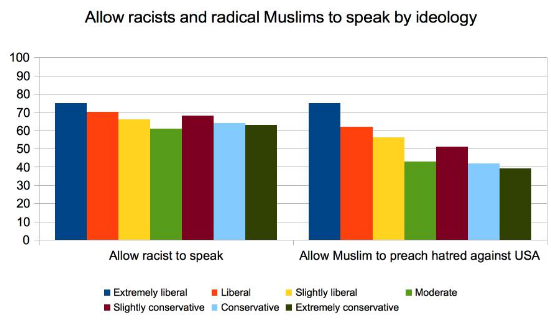People my age recall the “Let Reagan be Reagan” chant from his true believers. With Trump it’s the opposite; you don’t want him to to be himself. Here’s what Steve Bannon thinks is the real Trump:
“We still have a huge movement, and we will make something of this Trump presidency. But that presidency is over. It’ll be something else. And there’ll be all kinds of fights, and there’ll be good days and bad days, but that presidency is over,” Bannon said. He added that it would be a miscalculation to assume Trump will change.
“His actual default position is the position of his base,” Bannon said. “I think you saw it this week on Charlottesville.”
I think that’s right. The real Trump is a guy who’d like to be a fascist dictator committing war crimes, but our country won’t let him fill that role. (That’s why Trump respects people like Duterte and Putin more than the Angela Merkels of the world.)
Right after the election, I pointed out that early appointments like Flynn and Bannon were either loony or scary. Now they are gone, as are many others. Don’t get me wrong; it’s still a bad administration, but it’s no longer horrific, off-the-charts bad. People like Cohn and Kelly are now in charge.
It’s been interesting to watch the National Review pivot once again. They were strongly anti-Trump during the campaign, before tilting more in his favor after the election. Now they are once again appalled:
In One Tweet, Donald Trump Just Spread Fake History, Libeled a Hero, and Admired an Alleged War Crime
[Trump’s recent tweet] is almost certainly referring to a story he told during the campaign. He claimed that General John J. Pershing crushed an Islamic insurgency in the Philippines by committing a heinous war crime. Here’s Trump at a South Carolina rally:
They were having terrorism problems, just like we do,” Trump said. “And he caught 50 terrorists who did tremendous damage and killed many people. And he took the 50 terrorists, and he took 50 men and he dipped 50 bullets in pigs’ blood — you heard that, right? He took 50 bullets, and he dipped them in pigs’ blood. And he had his men load his rifles, and he lined up the 50 people, and they shot 49 of those people. And the 50th person, he said: You go back to your people, and you tell them what happened. And for 25 years, there wasn’t a problem. Okay? Twenty-five years, there wasn’t a problem . . .
Trump isn’t just spreading falsehoods, he’s doing so in a context that puts a presidential stamp of approval on war crimes. Even worse, he’s doing it in direct defiance of the warrior ethos of the American military. There is no possible way that any of Trump’s generals would approve of this sentiment. I’ve never met an American officer who would carry out an order to commit an atrocity like this.
Trump is careening out of control. He says what he wants, when he wants, and neither truth nor consistency nor wisdom nor prudence dictates a single syllable that comes out of his mouth. By many accounts he’s taken to directly defying his advisers simply for the sake of declaring that he’s in charge. This isn’t leadership. It’s a collection of temper tantrums. Unfortunately, those tantrums have consequences.
People are shocked that we’ve ended up with a madman in the White House, but this was all clearly spelled out in the campaign. GOP voters apparently had no problem with a candidate advocating war crimes.
Going forward, the key will be whether the grownups in the room can keep the big baby in his crib. I hope and pray that our generals have privately decided not to carry out a order to launch a nuclear attack, unless of course the generals agree with Trump that there is a threat that would justify that sort of action.
PS. Heh Mr. Macho Trump: How come you didn’t tell us during the campaign that there was a Washington establishment that would emasculate you once you took office? You told us that you were a man of action that would get things done. “Who knew the deep state could be so complicated?”
PPS: The bigger the threat, the bigger the overreaction:
1. WWII leads to internment camps for Americans wrongly called “Japanese”.
2. Stalin leads to McCarthyism
3. 9/11 leads to TSA and NSA abuses, plus the Iraq war
4. The alt-right is leading to a rise in left-wing opposition to free speech.
The right attitude was to oppose internment camps, McCarthy, and the NSA, but to oppose the Nazis, Stalin and Al Qaeda even more strongly. Much more strongly. That seems pretty simple, but it’s remarkable how few people are able to do so.
So oppose the left-wing overreaction, but oppose what provoked that overreaction even more strongly.
 This goes against the widely held view that PCism is concentrated on elite college campuses. Presumably liberal arts professors score pretty high on a vocabulary test.
This goes against the widely held view that PCism is concentrated on elite college campuses. Presumably liberal arts professors score pretty high on a vocabulary test. PCism is also associated with the extreme left, whereas in fact the extreme left is the most tolerant of controversial views:
PCism is also associated with the extreme left, whereas in fact the extreme left is the most tolerant of controversial views:

